|
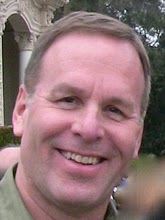
|
| Jothy Rosenberg |
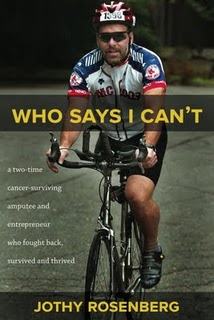
Talking to Jothy Rosenberg, author of Who
Says I Can’t
The Smoking Poet: We
are very excited to feature your book, Jothy, in our spring issue nonfiction pages. Along with our interview, we have a review and an excerpt for our readers. Can you give us a short synopsis of the story you tell in Who Says I Can’t?
Jothy Rosenberg: It’s
about hearing the words, “you have zero chance of survival,” at the age of 19, after already having lost one leg
and one lung to cancer as well as an extensive course of chemotherapy and what all of that does to you. More importantly,
the book is about how one goes about fighting back, recovering, and thriving in the face of all of that adversity.
TSP: What
inspired you to tell your story? Has writing it brought you any surprises? Perhaps had some healing effects? Deepened an understanding
of the remarkable experience that is your life?
Jothy: At
the most basic level, this is the book I wish I had had at 16, lying there with only a stump where my leg had been and with
my mind on fire. But I was completely on my own to figure out how to do basic things, how to regain a sense of “normalcy”
and how to truly go past that and build up the strong self-confidence necessary for a good life. It took a long time, but
eventually I felt like I had gained a sense of how to communicate that in a way that everyone dealing with life’s adversities
can benefit. That was when I felt like I had a book worth writing.
TSP: Was
it ever difficult to write this story? After all, in writing, the writer must relive what has been.
Jothy: The
very first version was quite cathartic to write but it was not publishable as I aired too many personal things. Once I got
that out of my system I could write a book that was readable and valuable to others. Yes, there were hard parts to relive.
Especially writing about what chemotherapy was like. The effect chemo has on the mind is profound, and even after all these
years spending time on those details actually brought back strong waves of nausea.
TSP:
You have faced so many difficult, even terrifying moments in your life, and some of those at a very young age. To what do
you attribute your extraordinary coping skills?
Jothy: I
have met so many people who have had to face very difficult life situations and almost uniformly have quickly developed great
coping skills. That has led me to believe this kind of resilience is part of the “human condition.” We are all
stronger then we might think. I remember wondering if I could do this—even I had moments of self-doubt and even self-pity.
Having said that, it is just possible my somewhat rebellious nature evident from an early age was beneficial to me in the
end.
TSP:
You state in one place in your book that you believe it was just this experience of having and beating cancer that made you
so driven … but in reading about your childhood, I detect some of that fighting (even rebellious) spirit early on. For
instance, in the scene where you learn how to propel a canoe forward without using oars, simply by standing on it. That took
a lot of persistence, no doubt many spills. To not only cope, but thrive the way that you have over your lifetime, do you
think this is possible to anyone under similar circumstances? Or are some of us made of sturdier stuff than others?
Jothy: Sure,
some are sturdier than others. But—and I know saying this is going to be controversial—I am one of those that
actually think a bit of adversity is good for all humans. You know the old saying, “What doesn’t kill you, will
make you stronger.” In a sense I agree with that and that everyone when tested will rise up and will gain strength from
rising up.
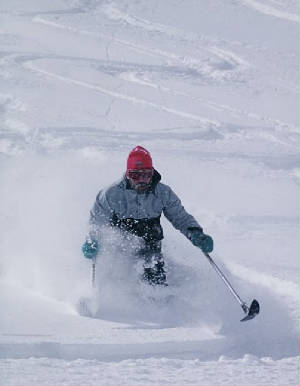
|
| Jothy on skiis |
TSP:
There’s a part in your book where you write, “It was only years later, many years into adulthood, that I was able
to see that my diagnosis was actually the beginning of a journey toward the meaning and purpose of my life. A journey we all
have to take, disabled or not.” (Page 11) When I hear such stories as yours, Jothy, I always have to wonder: is there
such a thing as destiny? That we are indeed given a predetermined set of trials and tribulations that will test our mettle
and make of us better, stronger, wiser people? Unless, of course, we give in and don’t meet the fight head on. Do you
think this two-time battle with cancer was your destiny? Destiny with a purpose of….?
Jothy: I
actually don’t subscribe to the notion of destiny. But of course we can’t be sure, so I could be completely wrong.
I believe that it is up to the individual to make their own “destiny.” I was dealt a certain hand with some bad
luck (obvious) and some good luck (most died back then from osteosarcoma, and I did not) and from there I was on my own to
make from that whatever I could. OK, so having said that, I do still believe that one can find a really worthwhile purpose
to live for. That seems for me to be changing from being an entrepreneur into spending more and more time talking about how
to fight back and what it takes to regain one’s footing in life.
TSP: Would
it be fair or unfair to say you may be able to now, years later, look back and call this a blessing? If you had the power
to do so, would you change your life and relive it without the experience of cancer?
Jothy: Very
tough question and one that is really too hypothetical for me to comfortably answer directly. A blessing, no. And would I
wish this on me or on anyone else, no again. But did it make me a better person? That is the really hard part and my guess
(with no way to prove it), is yes. Would I have had a good life without cancer and a disability? Sure, but it would have been
a completely different life, and I doubt I would have really inspired anyone in that life. But I never sit around wishing
this had never happened. What is the point? I can’t make it so, and I have no choice but to do the very best I can with
what I have.
TSP: What
do you want people to understand when meeting someone who is in some manner physically different, either from birth or through
circumstance?
Jothy: First
of all, don’t stare and—teach your kids not to stare. But don’t ignore them either. Feel free to ask them
a question, but remember they get lots of attention for being different and that gets tiresome. My experience is that especially
when kids are friendly, curious and direct that they will be well-received.
TSP:
In many cases, I imagine people are not so much malicious as dense, or na´ve, when dealing with any kind of physical disability
in another. We instinctively fear the unknown, the different. Many of us mean well, but we are not sure how to react and fear
being offensive. Again, what do you wish people would do, say? Is it okay to sometimes offer help?
Jothy: As
I point out in the book, it is very tough to know when someone needs help and when they don’t. For someone in my situation,
that is even harder on people because my situation is so dynamic, going from wearing a prosthesis to being on crutches. I
would try to follow that person’s lead and not jump too quickly to help. Do the simple things like open doors, but wait
to get some indication from them for more, especially if it involves touching them.
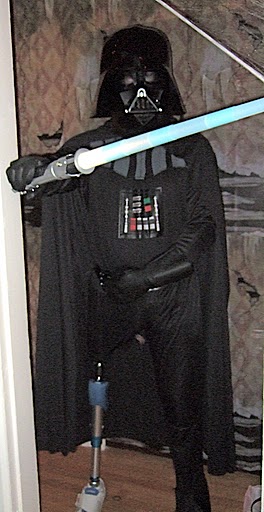
|
| Never lose your sense of humor: Jothy as Darth Vader |
TSP: Tell
us something of your proudest achievement …
Jothy: Without
question, it is the fact that my kids like me and are proud of me. Like any father, I am of course insanely proud of and fond
of them. But my relationship with my dad is not what I wanted to have with them. As things turned out with my kids, we are
truly good friends and that was never something I took for granted. (Second most proud achievement is this book, but you already
knew that.)
TSP: And
please tell us something about your many, many philanthropic and fundraising efforts, Jothy, and if there is a place online
where we can learn more, perhaps contribute or even get involved.
Jothy: I have two main causes: I direct people toward the Dana-Farber Cancer Institute in Boston. They were on the
forefront of chemotherapy work in the mid-70s, and I am convinced chemo played a major role in my surviving. I give to them
proceeds from the book and donations collected for the 192-mile bike ride every summer, called the Pan-Mass Challenge (www.pmc.org ). The other big athletic event I do for charity is the Alcatraz swim across San Francisco Bay, proceeds
of which I direct to Boston Healthcare for the Homeless Program (www.bhchp.org ) where my wife works, taking care of Boston’s HIV positive homeless.
TSP:
Your approach to business seems much the same as your approach to a swim across the bay to Alcatraz. Tell us something about
your business life, and what venture(s) are you pursuing now? Are your physical and intellectual achievements connected in
any way?
Jothy: I
have been involved in starting, running or funding at least eight startups to date. One I am working on right now with my
cousin/co-founder is called Rocketvox. Have you ever been frustrated that you have to use a couple of different applications
to get all your e-mail, a phone for calls, texts and voice mails, your browser to get messages from Facebook and LinkedIn,
and yet other things to deal with faxes, instant messenger and maybe Skype? We don’t think it should be this hard, and
we have created a single client that does all of that and runs on your computer or your phone. The best part about our company
is that we never had to seek outside funding so we still have complete control. And if you read my book you will see what
can happen when you get money from outsiders—it can backfire and kill your dream.
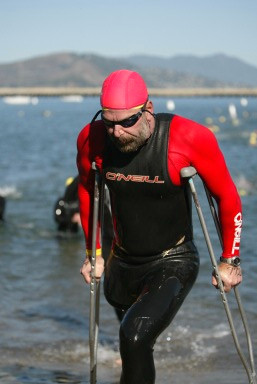
|
| Jothy after swimming to and from Alcatraz (California) |
TSP:
To anyone facing what seem impossible odds, what would you say?
Jothy: You
are tougher and more resilient than you ever could have imagined. Fight back just with one little victory after another. Set
a modest goal for something you will do to regain your balance and sense of normalcy. Achieve that and set the next goal.
After a few of these little victories, your confidence starts to build, making it easier to tackle the next and the next.
And before you know it, you are strong and inspiring others and that will seem to have happened by accident. If you are willing
to focus like a laser beam on a goal and work hard at it, you will out-focus and out-achieve others to the point where, once
you have time to look around, you will find you are better at it than most anyone else. That too will seem to have happened
by accident.
TSP: What
challenges do you still hope to meet and beat (Jothy’s Bucket List)? And, do you think you will ever reach this point
where you will say … enough? I can sit back and rest now?
Jothy: I
have several. First, I want this book, Who Says I Can’t? to “go national,”
so that a large number of people can benefit from its messages. Later, I want to write a book about business, and I want to
write a novel. I also want to go back to teaching at the university level. I want to win my age group in the Alcatraz swim
one of these years (but I realize I might have to do that by outliving all my competitors). In terms of sitting back and resting,
not exactly, but having more time, yes. I would love to have time to build furniture again and to do lots more boating with
my wife and dogs.
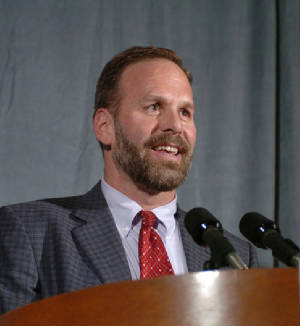
|
| Jothy as an inspirational speaker |
TSP:
You’re quite the inspiration to many, Jothy, whole in body or not. Who is your
role model? Who inspires you?
Jothy: My
wife Carole is incredibly inspiring (as well as being my anchor and stabilizer). Everyone that knows us says I am married
to a saint and they are right. For over 20 years her specialty has been to provide medical care to people with HIV. That is
hard, and seems to me would be draining, but she just keeps at it with the highest level of commitment you can imagine.
TSP:
Thanks so much, Jothy. Before we let you race off again, please let us know if you are planning any book tours, real or virtual,
and where we can learn more about you and your book, and, of course, purchase it.
Jothy: I have a small PR team working on some book tours, and I am open to going almost anywhere and talking about
the book and my story. (That includes coming to Kalamazoo, Michigan, at some time.) The book can be ordered online at as well as from Amazon and is in book stores (maybe not on the shelves but can be ordered). Please join my fan page on Facebook where readers post their comments and can see all upcoming events. And, finally, I maintain a
blog which is where the book started and where I continue to expand on themes from the book. Thank
you so much for talking to me about this.
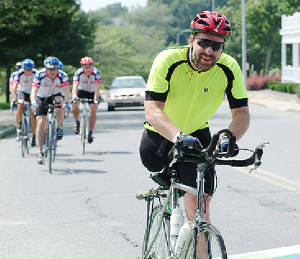
|
| Jothy on a PennMass bikeathon |
An excerpt from Who Says I Can't?:
"The old PA students’ group that had been
with us on our prenuptial honeymoon continued to vacation together frequently. We all had kids. We had three; Eric and Cristin
had two; and Pat and Susan had one. In the main room of the ski cabin we rented one year was a bevy of rollaway cots. I wore
my prized Telluride sweatpants. They were extra special because we had had great difficulty finding sweatpants with the Telluride
logo down the left leg. (A logo on the right leg would be useless, as it would be cut off.) I was walking through the room
on crutches, navigating my foot and crutch placement carefully to miss beds, ski clothes, and people’s feet. As I passed
near Susan, without me knowing it, she was in the midst of a profound debate with herself. If he was me and I was him, he
would trip me for sure. If I don’t trip him, I’m catering to the disability and that is a sure no-no. So should
I do it or not? She had to decide quickly. Out went her foot and she got me good. Without all the obstacles, I would have
just done a stumble, hop, hop, and recovered. But one crutch caught on a bed, the other caught on a ski boot, and I went down
hard. As I went down, everyone else in the room looked aghast at Susan. They all thought, How could you do that, Susan? You
just tripped a guy on crutches. She was pretty upset with herself, thinking this is not what she intended to have happen.
The worst of it was that one of the bed frames
got a good hold of the pant leg right by the Telluride logo and ripped it up the whole leg. When I came up, there was no blood,
no pain, but there were ruined sweatpants. Susan was still in shock. For the ripped sweatpants, and only for that, Susan was
in trouble with me. She was buying me new, logo-on-the-left-leg Telluride sweatpants or else."
Purchase Who Says I Can't? by Jothy Rosenberg.
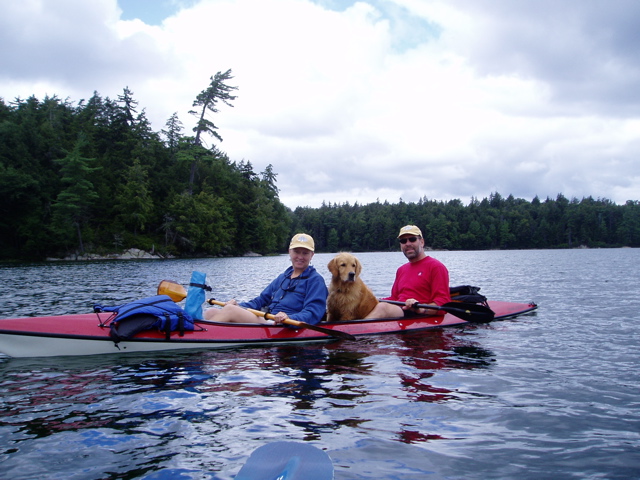
|
| Jothy kayaking with wife, Carole, and Gambit |
|

